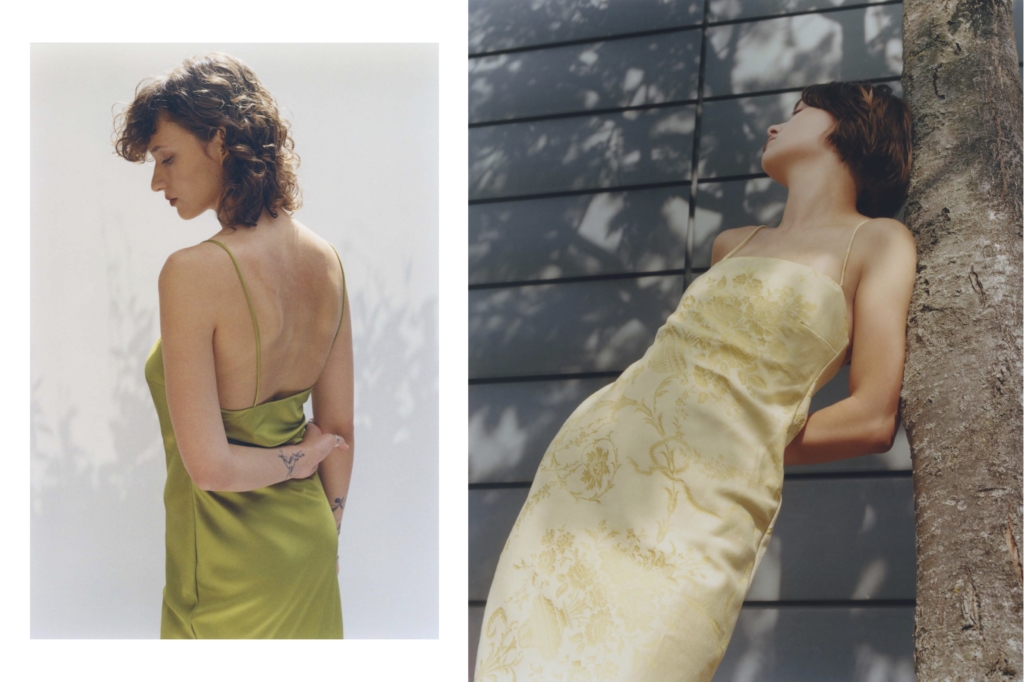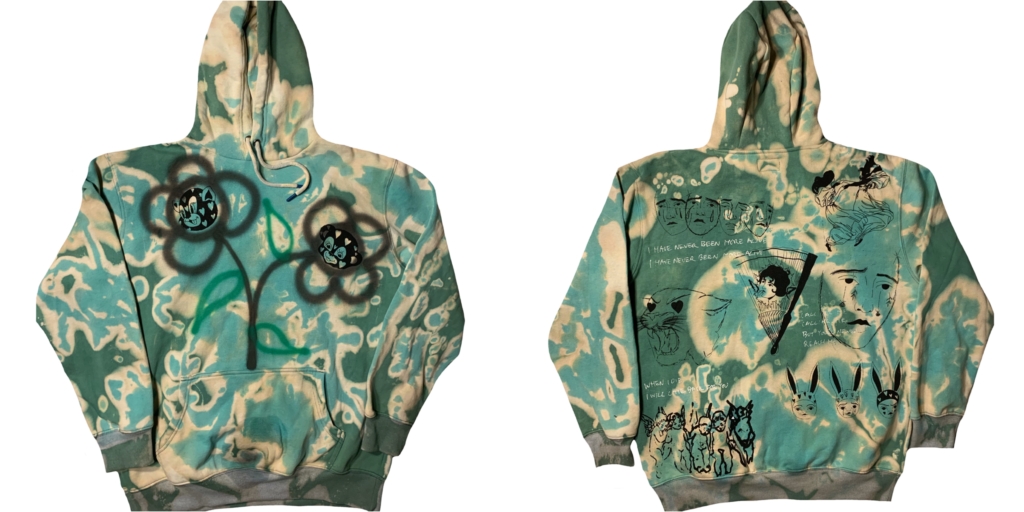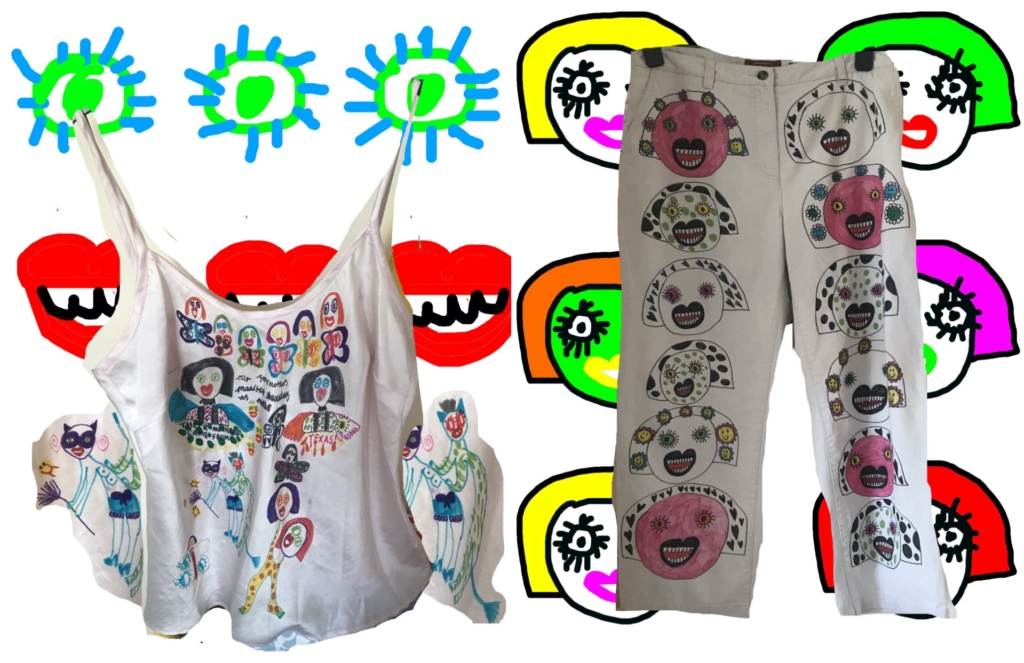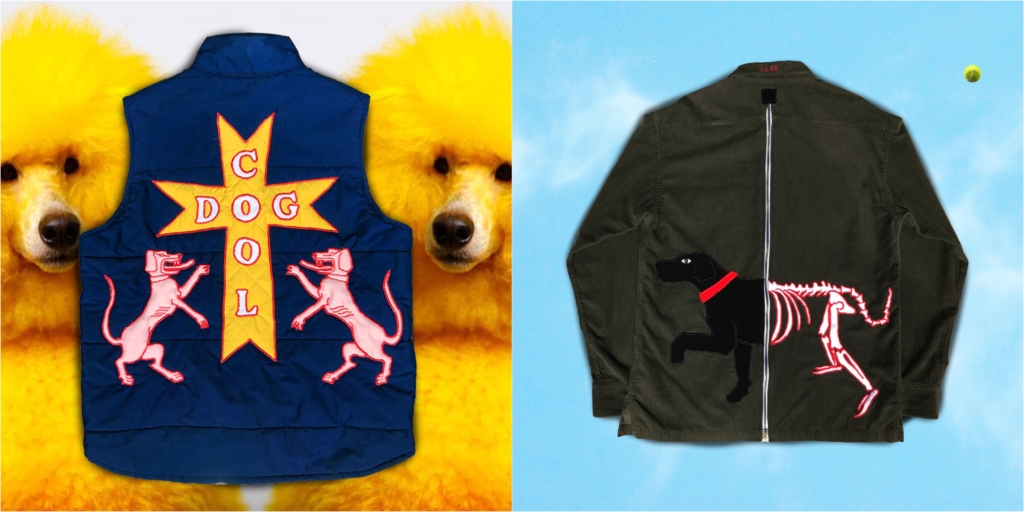JEAN WATT speaks with four creatives who are making bespoke and up-cycled clothing to explore how fashion is slowing down, becoming more personal and more sustainable.
Bespoke and commission based brands have been growing in popularity since the dawn of ‘slow fashion’, a term coined by Kate Fletcher in 2007. Combatting the wide-ranging negative effects of the fashion industry, this movement encourages more sustainable work practices and a more personal experience of buying and owning clothes. Artists and creators are up-cycling clothing and fabrics to create unique, handmade pieces which take in to account the resources and processes that go into their production. With many people stuck at home at the moment and feeling inspired to take up their own making as well as buying from smaller businesses, will this lockdown period speed up the progress of slow fashion? I spoke with four creatives about their work and their relationship to sustainability.
Okaytattoos is a London-based tattoo artist who customises and up-cycles clothing with her own designs. Her process starts by bleaching or dyeing the pieces, and then screen-printing, airbrushing and hand painting them.
Okaytattoos began making clothes with a sustainable focus, working so as not to increase her carbon footprint and to lessen the demand for poor labour conditions. ‘The only things I buy new are my inks and screens, and since taking up airbrushing my need for these items has lessened heavily,’ she explains. ‘I think owning pieces and supporting artists who hand make clothing, especially in a sustainable way, is a rewarding experience’, the artist continues, seeing the value in slow fashion both environmentally and personally. ‘Especially if [the pieces] are one of a kind, it is also a lot more personal, something you don’t need to feel guilty about as you’re directly supporting the individual’.
‘I’ve been very fortunate that I started making my clothes a couple of months before lockdown started’, she explains. ‘As a professional tattoo artist who could no longer tattoo, I would have had no money coming in’. Talking about how this period of lockdown may have positively impacted her work, she says: ‘I have been able to really focus on my clothing and how I want it to look. I think a lot of people have had extra time on their hands and are learning how to do a lot of things themselves, [such as] tie dye and hand sewing. I have also noticed a rise of artists making clothes for an income during lockdown meaning more people have access to handmade, super unique pieces. I think it’s a really interesting time for small creators right now’.
Find her work on instagram @okaytattoos, @okay_sadface and on okaymerch.com
Kat Rose is an artist, writer and performer based in Portsmouth. Her process involves up-cycling clothing and altering them with her own illustrative designs. She also offers a commission service, working on people’s own items of clothing.
I spoke to Kat about the growing popularity of a slower fashion mindset. ‘I think it’s great that people are being more considerate and open minded about shopping now, I’m overjoyed at the number of people I’ve seen recycling their clothes on Depop, or repurposing and customising their clothes’, she says. ‘I hope this encourages high street brands to do the same, or to stop making as many clothes as they do altogether!’ She goes on to explain that there needs to be more awareness about the social and environmental impact of people’s shopping habits. ‘It always starts with greed and exploitation. I want to see brands being held accountable. And to be perfectly honest I want to fight Jeff Bezos on live TV’.
This period of lockdown has impacted Kat’s work both negatively and positively; the circumstances which creatives are working under are distressing, however it has given her more time to focus on making, and the administrative necessities that come with running a small business. She is hopeful for what the future now holds for creatives: ‘I am really excited to see so many artists getting support during this time, and I hope it carries on into forever’. She recognises that there is still, of course, room for improvement, adding: ‘please, for the love of god, people need to have way more respect for disabled and neurodivergent artists after this than they already do! That’s my main hope!’
Find Kat on instagram @leflyingsaucerchat and at katrose.fun
 Moss Omey is a London-based designer making bespoke made-to-measure slip dresses from vintage fabrics.
Moss Omey is a London-based designer making bespoke made-to-measure slip dresses from vintage fabrics.
Moss Omey’s relationship with the world of sustainable fashion is complex. She tells me, ‘It is almost an oxymoron, [as] the fashion industry is the leading contributor to environmental pollution. It is not enough to just use sustainably produced fabrics, we need to tackle the demand, the pace and simply use up resources that have already been produced’. For her, slow fashion is as important conceptually as it is in practice; it is a change of mindset, a shifting of perception and action. She goes on to say, ‘It is very easy to say you use sustainable fabric therefore your entire brand is sustainable… but it is not actively changing the system. Slow fashion confronts mass production, wastage and the throw away culture of consumers’.
Due to the bespoke tailoring of Moss’ clothing, the lockdown has interrupted her fitting process meaning she has had to put a pause on taking orders. ‘I have kept in touch with clients and will reconnect once it is safe, however, I will be rethinking the process of my bespoke slips to accommodate the new way of life post lockdown’, she says. ‘Lockdown has been a lot of ups and downs but ultimately it has proven to be some much needed time out from life to reflect, evaluate and educate myself in being, hopefully, a better version of myself by the end’.
Find Moss on instagram @moss.omey and at mossomey.com
Flikgotnohair is a designer based in the UK and Madrid, who up-cycles clothing to make one-off customised pieces with free-hand machine embroidery.
For FLIK, creating sustainable fashion is not only important in regard to environmental benefit, but also to show people that it is a possible way forward for the whole (fast) fashion industry. He hopes his work can encourage a movement away from the practices of large, environmentally-damaging brands. ‘The bulk of my work is up-cycling clothing, using pre-worn garments. I take garments that people love, and that they know fit them well, and turn them into something sexy and new’.
Luckily, FLIK’s work process has not been too badly affected by the lockdown. However not being able to go out and meet people has put collaborations on hold. Despite this, he has also seen this period as a valuable time for developing ideas. ‘People have had more free time to think about and come up with ideas of things they want made. I think when the lockdown ends people are going to go nuts wearing everything they’ve been waiting to put back on, or that they have bought during quarantine’.
Find FLIK on instagram @flikgotnohair and at flikgotnohair.com








